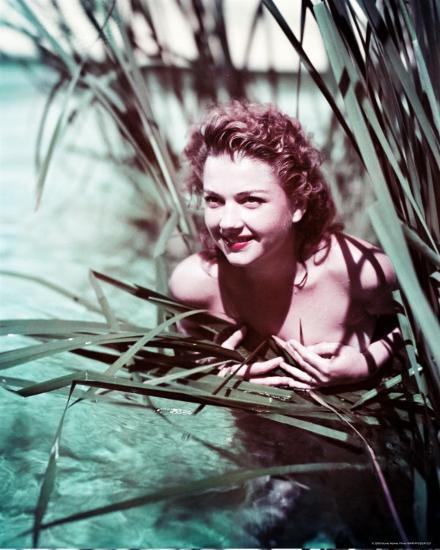In the shimmering constellation of Hollywood’s Golden Age, few stars shone as brightly — or as enduringly — as Anne Baxter. With her distinctive blend of striking beauty, emotional range, and theatrical pedigree, Baxter carved out a unique space in American cinema, captivating audiences throughout the 1950s and beyond.
Born on May 7, 1923, in Michigan City, Indiana, Anne Baxter seemed destined for the stage and screen. She was the granddaughter of famed architect Frank Lloyd Wright, and her early exposure to the arts — coupled with training under renowned acting coach Maria Ouspenskaya — laid a strong foundation for a career marked by both versatility and depth.

A Meteoric Rise and a Classic Role
Baxter began acting in films in the early 1940s, quickly catching the eye of critics and directors alike. Her breakout moment came with “The Razor’s Edge” (1946), where her poignant portrayal of Sophie MacDonald — a grief-stricken woman battling addiction and loss — earned her the Academy Award for Best Supporting Actress. It was a performance layered with vulnerability and grit, marking her as more than just another ingenue in a studio system full of glamorous faces.
But it was her role in “All About Eve” (1950) that truly cemented her legacy. Starring opposite Bette Davis, Baxter played Eve Harrington, an ambitious and cunning young actress who manipulates her way into the spotlight. With quiet intensity and a flawless sense of timing, Baxter created one of cinema’s most memorable antiheroines — a character as complex and fascinating as any in film history.
The film was nominated for a record-setting 14 Academy Awards and won six, including Best Picture. Baxter’s performance earned her a Best Actress nomination, and her chemistry with Davis remains iconic to this day.

A Career of Range and Elegance
Throughout the 1950s, Anne Baxter proved that she was far more than a one-role wonder. Her filmography includes a range of characters — from femme fatales and tormented lovers to noble heroines and historical figures.
In “The Ten Commandments” (1956), Cecil B. DeMille’s epic biblical drama, Baxter portrayed Nefretiri, the Egyptian queen torn between duty and forbidden love. The role demanded grandeur, sensuality, and emotional conflict — all of which Baxter delivered with striking conviction. The film became one of the decade’s biggest hits, and her performance remains one of its unforgettable highlights.
What set Baxter apart was her ability to bring humanity to every character — whether flawed or virtuous. She approached each role not as a vehicle for vanity, but as a challenge to reveal something truthful and resonant. This rare commitment to craft, combined with her expressive eyes and commanding screen presence, made her one of the most respected actresses of her generation.

Beyond the Silver Screen
While Anne Baxter is most remembered for her film work, she also made significant contributions to the stage and television. She appeared in multiple Broadway productions and took on a number of television roles in the 1960s and 1970s, embracing the evolving landscape of entertainment with grace.
Her TV appearances included guest roles on Batman, Ironside, and The Love Boat, showing that she could adapt to new formats without sacrificing her presence or artistry.
Later in life, Baxter also took on the role of Victoria Cabot in the beloved detective series Hotel (1983–1985), further introducing her to a new generation of viewers.

A Legacy of Depth, Style, and Substance
Offscreen, Anne Baxter was known for her intelligence, warmth, and independent spirit. She wrote a well-received memoir, “Intermission: A True Story”, chronicling her personal life, including her time spent living on a ranch in Australia and her reflections on life in and out of Hollywood. She also raised three children and maintained strong ties to her family, finding a balance between her public career and private passions.
Baxter passed away in 1985, but her contributions to film and television remain timeless. Whether portraying a fragile soul, a scheming starlet, or a regal queen, she imbued every role with authenticity and grace.
Today, Anne Baxter is remembered not only as a glamorous face of classic Hollywood, but as an actress of rare emotional intelligence and range. Her work continues to be studied, admired, and loved — a testament to her enduring influence on screen storytelling.

Anne Baxter wasn’t just a star — she was an artist, unafraid to shine brightly and burn deeply.
Her legacy, like her most iconic performances, is unforgettable.